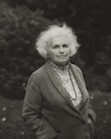I’m now in year 5 of working on my (first) novel, which seems like a long time to me. But according to everyone I’ve heard, 5-7 years is average for a first novel. For some, though, novelists just work Too Damn Slow. At least, that’s what Dwight Garner suggested in a recent essay in the New York Times:
There have always been prolific writers as well as slow-moving, blocked, gin-addled or silent ones. It’s worth suggesting, though, that something more meaningful may be going on here; these long spans between books may indicate a desalinating tidal change in the place novelists occupy in our culture. Suddenly our important writers seem less like color commentators, sifting through the emotional, sexual and intellectual detritus of how we live today, and more like a mountaintop Moses, handing down the granite tablets every decade or so to a bemused and stooped populace. We roll our eyes at how seldom Time magazine puts writers on its cover — it once did so quite often — and sense this is evidence of the public’s shrinking appetite for quality literature. Perhaps it has got more to do with our novelists’ lagging output, their eroded willingness to be central to the cultural conversation. […]
Updike and Oates are extreme examples, but there’s something to be said for what might be called the Woody Allen Method: Good times, bad times, you keep making art. Many of your productions will hit; some will miss; some will miss by a lot. But there’s no time for the flatulent gas of pretension to seep into your construction’s sheetrock. This is how Trollope, Balzac and Dickens worked. Each would have agreed with Gore Vidal, who once declared of those who moan about writer’s block: “You’re not meant to be doing this. Plenty more where you came from.”
Garner understands and acknowledges the many delays that beset writers–jobs, ambition, revolt against the James Pattersons of the world–but in closing, he argues,
I’ve picked on Franzen and Eugenides, writers I admire, more than enough in this small essay. (And I’ve ignored many fine writers who publish more frequently.) But let me conclude with this autumnal observation. At their current rate of production, by the next time a novel from either appears, my children, not yet in high school, will have graduated from college. Actuarial tables inform me that my dogs, their muzzles not yet close to gray, will have died and been buried in the backyard. Two presidents may have come and gone.
I won’t entirely have forgotten these writers, but I will have learned to live without them.
What’s a writer to do? Well, for those novelists trying to speed up their output, Michael Agger (writing in Slate) looks at the research on how to write faster:
[Ronald] Kellogg, a psychologist at Saint Louis University, tours the research in the field, where many of the landmarks are his own. Some writers are “Beethovians” who disdain outlines and notes and instead “compose rough drafts immediately to discover what they have to say.” Others are “Mozartians”—cough, cough—who have been known to “delay drafting for lengthy periods of time in order to allow for extensive reflection and planning.” According to Kellogg, perfect-first-drafters and full-steam-aheaders report the same amount of productivity. Methinks someone is lying. And feel free to quote this line the next time an editor is nudging you for copy: “Although prewriting can be brief, experts approaching a serious writing assignment may spend hours, days, or weeks thinking about the task before initiating the draft.”
Are you a slow cooker? Do you worry about your pace of production, or have you made peace with letting things “stew”? If you’re the opposite of a slow cooker–a stir-fryer, let’s say–what are your secrets to getting work done?
Further Reading:
- Why slow thinking (and writing) can actually be good for you
- The ten-year novel
- The ten-year STORY






